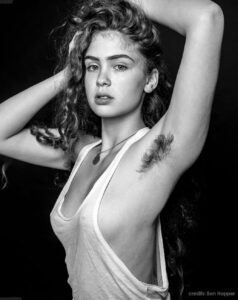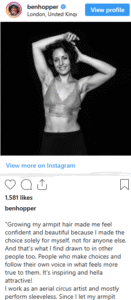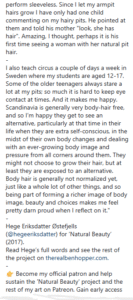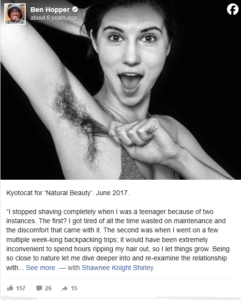Bold Photo Series Confronts Beauty Norms by Embracing Female Body Hair

A striking new photo series is sparking conversation by challenging traditional ideas of beauty and encouraging women to embrace something often hidden or removed: natural body hair.
Long before modern grooming tools became the norm, the practice of hair removal was already embedded in human culture. In prehistoric times, men and women used crude instruments like sharpened stones and seashells to strip away body hair — often for hygiene, ritual, or status.


Ancient Beliefs, Modern Pressure
The notion of hairlessness as a sign of attractiveness gained momentum in the 19th century, influenced by thinkers like Charles Darwin. His theory of sexual selection helped shape the idea that less body hair was linked to being more evolved or desirable. Over time, this idea took root in society, elevating smooth skin as a beauty standard — especially for women.
By the early 20th century, female body hair was increasingly viewed as undesirable. Shaving became not just a preference but a social expectation, reinforced by advertising and popular media. Hair removal was framed as a woman’s duty — a mark of hygiene, femininity, and self-care.
Rethinking the Razor
Today, that narrative is slowly beginning to change. A growing number of women are rethinking their relationship with body hair — not as an act of defiance, but as a choice rooted in comfort, identity, and self-expression.
Photographer Ben Hopper, based in London, has become a key voice in this shift. His ongoing series Natural Beauty aims to challenge taboos by showcasing women with unshaven armpits in elegant black-and-white portraits.
“I was interested in why female armpit hair still seems to provoke such strong reactions,” Hopper told Bored Panda. “When you look at mainstream beauty in film and fashion, the standards are extremely narrow. I wanted to contrast that polished ideal with something raw and real.”

Embracing the Unconventional
Since starting the project in 2007, Hopper has worked with models and actresses who not only posed for the camera but also shared their personal stories of growth, freedom, and confidence.
One participant, known as Kyotocat, described her experience: “When I stopped shaving, I felt a huge sense of relief. Like I could finally breathe. It gave me back a kind of inner strength I didn’t know I was missing.”
Another model, Sophie Rose, said she found power in going against expectations. “Not hiding my body hair made me feel bold. I even liked when people were uncomfortable — it made me feel like I had taken control of the narrative.”
For Gabriela Eva, growing her hair out for the shoot was an experiment in self-acceptance. “At first, I felt exposed,” she said. “But over time, I saw the beauty in it. Now, I feel more myself than ever.”
Beauty Without a Message?
Some participants, like Sienna, noted that choosing not to shave doesn’t always have to mean making a statement. “For me, it’s just about feeling at ease in my body,” she explained. “It shouldn’t always be viewed as a political act. Sometimes it’s just comfort.”
Swedish actress Emilie Bostdt echoed that thought: “It’s strange that something so natural is treated like a rebellion. That alone makes me want to keep my hair.”
Shifting the Conversation
Though Hopper’s work has ignited debate, he’s clear about his intentions. “I’m not saying every woman should grow their armpit hair,” he explained. “I just want people to realize there are alternatives. Let’s question what we’ve accepted as ‘normal’ for so long.”
As projects like Natural Beauty continue to gain attention, they help pave the way for a broader definition of beauty — one that includes choice, authenticity, and self-respect.
What Do You Think?
Is the world ready to embrace all forms of natural beauty? Share your thoughts and help us spread the conversation.